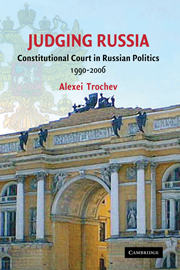Book contents
- Frontmatter
- Contents
- List of Figures and Tables
- Acknowledgments
- Abbreviations
- Notes on Transliteration
- 1 Introduction: Three Puzzles of Postcommunist Judicial Empowerment
- 2 Nonlinear Judicial Empowerment
- 3 Making and Remaking Constitutional Review, Russian-Style
- 4 Russian Constitutional Review in Action (1990–1993)
- 5 Decision Making of the 2nd Russian Constitutional Court: 1995–2006
- 6 The Constitutional Court Has Ruled – What Next?
- 7 The 2nd Russian Constitutional Court (1995–2007): Problematique of Implementation
- 8 “Tinkering with Judicial Tenure” and “Wars of Courts” in Comparative Perspective
- 9 Conclusion: Zigzagging Judicial Power
- Appendix
- Bibliography
- Statutes and Decrees
- Court Decisions
- Index
2 - Nonlinear Judicial Empowerment
Published online by Cambridge University Press: 25 July 2009
- Frontmatter
- Contents
- List of Figures and Tables
- Acknowledgments
- Abbreviations
- Notes on Transliteration
- 1 Introduction: Three Puzzles of Postcommunist Judicial Empowerment
- 2 Nonlinear Judicial Empowerment
- 3 Making and Remaking Constitutional Review, Russian-Style
- 4 Russian Constitutional Review in Action (1990–1993)
- 5 Decision Making of the 2nd Russian Constitutional Court: 1995–2006
- 6 The Constitutional Court Has Ruled – What Next?
- 7 The 2nd Russian Constitutional Court (1995–2007): Problematique of Implementation
- 8 “Tinkering with Judicial Tenure” and “Wars of Courts” in Comparative Perspective
- 9 Conclusion: Zigzagging Judicial Power
- Appendix
- Bibliography
- Statutes and Decrees
- Court Decisions
- Index
Summary
The core argument of this book is that rulers – regardless of their authoritarian or democratic pedigree – create and tolerate new constitutional courts as long as the latter: (a) provide important benefits for the new rulers, and (b) do not interfere too much with public policies. However, the enormous uncertainty during the change of political regime, the unstable policy preferences of the new ruling elites, judicial behavior, and the incapacity of the government machinery to obey court decisions – these four factors blended together complicate a cost–benefit calculus of having a strong judicial review and facilitate the unintended nonlinear trajectories of judicial empowerment.
To explain why judicial empowerment during the change of political regimes is a nonlinear process, the rest of the chapter consists of three parts. First, it defines judicial empowerment as a dynamic feedback among the three variables: the court design, judicial decision making, and the enforcement of court decisions. Next, it takes a closer look at the benefits provided by the judicial review during the regime change and describes a feedback mechanism that facilitates the nonlinearity of judicial politics. Then, it explores the four factors that exacerbate the nonlinearity in transitional judicial politics and four potential objections to my argument.
DESIGN, JUDGING, AND COMPLIANCE: A TRILATERAL DYNAMIC OF JUDICIAL REVIEW
A traditional way to think of the relationship among the institutional design of courts, their judgments, and compliance with them is to construct it in a temporal linear sequence. First, a court is created and staffed.
- Type
- Chapter
- Information
- Judging RussiaThe Role of the Constitutional Court in Russian Politics 1990–2006, pp. 19 - 53Publisher: Cambridge University PressPrint publication year: 2008



